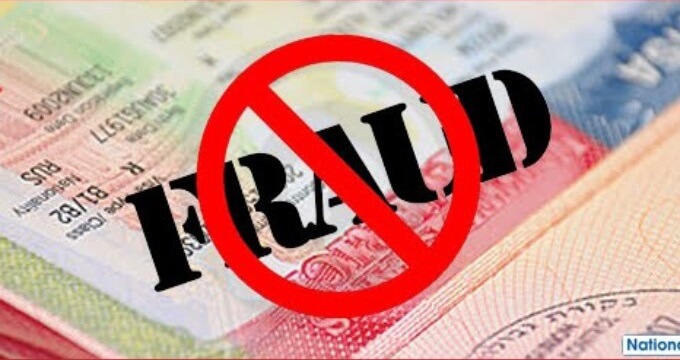USCIS played a critical role in uncovering a large‑scale employment visa fraud scheme that led to federal indictments in Texas. The agency flagged dozens of suspicious EB‑2, EB‑3 and H‑1B petitions, exposing forged degrees and fake work‑experience letters. Its referrals to Homeland Security Investigations and the FBI triggered arrests of two Texas residents and two related business entities.
The indictment charges defendants with conspiracy to defraud the United States, visa fraud, money laundering and racketeering under RICO. Prosecutors allege the scheme enabled unqualified applicants to gain work authorization and permanent residency in exchange for fees of up to $10,000. If convicted, each defendant faces up to 20 years in prison and hefty fines.
By tightening fraud‑detection protocols and training officers to spot forged documents, USCIS aims to protect the integrity of the employment‑based visa system. This case highlights the agency’s commitment to defend honest applicants and safeguard U.S. labor markets. In the following sections, we break down USCIS’s investigative actions, the mechanics of the fraud, the charges and penalties, and how you can report suspected immigration benefit abuse.
Table of Contents
-
Case Overview
-
USCIS Role in the Investigation
-
Details of the Visa Fraud Scheme
-
Charges and Potential Penalties
-
Federal Investigation Partners
-
How to Report USCIS Benefit Fraud
1. Case Overview
On May 23, 2025, federal prosecutors in the Northern District of Texas indicted two Texas residents and two business entities for a wide-ranging employment‑based visa fraud scheme. The defendants, Abdul Hadi Murshid and Muhammad Salman Nasir—both Pakistani nationals—face charges of conspiracy to defraud the United States, visa fraud, money laundering conspiracy, and racketeering under RICO. The Law Offices of D. Robert Jones PLLC and Reliable Ventures, Inc. also stand accused of aiding the scheme. Criminal complaints allege fraudulent EB‑2, EB‑3 and H‑1B petitions enabled dozens of foreign nationals to enter or remain in the U.S. unlawfully. If convicted, each defendant could receive up to 20 years in prison; Murshid also faces denaturalization proceedings.
2. USCIS Role in the Investigation
USCIS played a central role by flagging suspicious filings. Agency officers reviewed thousands of employer petitions and detected patterns of falsified supporting documents. USCIS analysts cross‑checked credentials with the Department of Labor’s Office of Foreign Labor Certification and noted repeated use of identical work histories and fake degrees. When USCIS identified the anomalies, it referred the cases to Homeland Security Investigations (HSI) for deeper probe. This early detection helped federal agents compile evidence before arrests. USCIS continues to refine its fraud‑detection systems and to train officers on spotting forged documents.
3. Details of the Visa Fraud Scheme
According to the indictment, the defendants executed the scheme in three phases:
-
Recruitment & Application Preparation
-
Murshid and Nasir recruited foreign nationals in Pakistan and India.
-
They collected fees of $5,000–$10,000 per applicant.
-
-
Document Forgery & Submission
-
They forged university transcripts, work‑experience letters, and employer contracts.
-
They filed EB‑2, EB‑3 and H‑1B petitions via USCIS’s online system.
-
-
Money Laundering & Concealment
-
Funds moved through shell companies and offshore accounts.
-
They used fake invoices to justify transfers.
-
The scheme allowed unqualified applicants to receive work authorization and green cards.
4. Charges and Potential Penalties
The table below outlines the main charges and maximum sentences:
| Charge | Statute | Max Prison Term | Fine |
|---|---|---|---|
| Conspiracy to Defraud the U.S. | 18 U.S.C. § 371 | 5 years | $250,000 per count |
| Visa Fraud | 18 U.S.C. § 1546 | 10 years | $250,000 per count |
| Money Laundering Conspiracy | 18 U.S.C. § 1956(h) | 20 years | $500,000 or twice proceeds |
| RICO Conspiracy | 18 U.S.C. § 1962(d) | 20 years | $250,000 per count |
| Unlawful Naturalization (Murshid) | 18 U.S.C. § 1425 | 10 years | $250,000 |
| Attempted Unlawful Naturalization (Nasir) | 18 U.S.C. § 1425 | 5 years | $250,000 |
All charges carry significant fines and prison terms. Murshid may also face revocation of his U.S. citizenship.
5. Federal Investigation Partners
USCIS referred the case to these agencies:
-
FBI: Led forensic analysis of digital records.
-
HSI: Conducted field interviews and undercover operations.
-
State Diplomatic Security Service: Tracked suspect movements overseas.
-
DOL Office of Inspector General: Audited Labor Condition Applications.
-
U.S. Attorney’s Office, Northern District of Texas: Coordinated prosecution.
Each partner provided unique expertise. The multi‑agency task force met weekly to share leads and evidence.
6. How to Report USCIS Benefit Fraud
Anyone can report suspected fraud or abuse in USCIS processes. Follow these steps:
-
Complete the Form
-
Visit the USCIS Tip Form
-
-
Provide Detailed Information
-
Include full names, dates, and A‑number (if known).
-
Attach copies of suspicious documents.
-
-
Submit Anonymously or with Contact
-
You may choose to remain anonymous.
-
Providing contact details can speed the investigation.
-
-
Follow Up
-
USCIS may contact you for further details.
-
Your identity remains protected under federal law.
-
Use this process to help USCIS protect visa integrity and safeguard lawful applicants.
Maple Crest Immigration Law Firm
Secure your immigration future with confidence—partner with Maple Crest Law today. Our expert attorneys will guide you through every step of the USCIS employment‑based visa process, ensure your petitions meet all legal standards, and protect you from costly delays or allegations of fraud. Contact us now for a personalized consultation and let Maple Crest safeguard your visa applications with proven compliance strategies and dedicated support.


